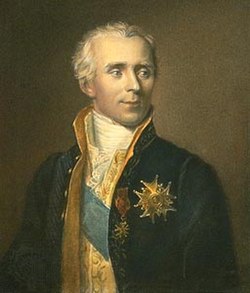Pierre-Simon Laplace Quote
We ought to regard the present state of the universe as the effect of its antecedent state and as the cause of the state that is to follow. An intelligence knowing all the forces acting in nature at a given instant, as well as the momentary positions of all things in the universe, would be able to comprehend in one single formula the motions of the largest bodies as well as the lightest atoms in the world, provided that its intellect were sufficiently powerful to subject all data to analysis; to it nothing would be uncertain, the future as well as the past would be present to its eyes. The perfection that the human mind has been able to give to astronomy affords but a feeble outline of such an intelligence.
We ought to regard the present state of the universe as the effect of its antecedent state and as the cause of the state that is to follow. An intelligence knowing all the forces acting in nature at a given instant, as well as the momentary positions of all things in the universe, would be able to comprehend in one single formula the motions of the largest bodies as well as the lightest atoms in the world, provided that its intellect were sufficiently powerful to subject all data to analysis; to it nothing would be uncertain, the future as well as the past would be present to its eyes. The perfection that the human mind has been able to give to astronomy affords but a feeble outline of such an intelligence.
Related Quotes
Outside of the dreary rubbish that is churned out by god knows how many hacks of varying degrees of talent, the novel is, it seems to me, a very special and rarefied kind of literary form, and was, fo...
Usually, when people get an idea, they are eager to start acting immediately, immerse themselves in the process without creating a system of actions, without being knowledgeable of the matter, without...
About Pierre-Simon Laplace
Laplace formulated Laplace's equation, and pioneered the Laplace transform which appears in many branches of mathematical physics, a field that he took a leading role in forming. The Laplacian differential operator, widely used in mathematics, is also named after him. He restated and developed the nebular hypothesis of the origin of the Solar System and was one of the first scientists to suggest an idea similar to that of a black hole, with Stephen Hawking stating that "Laplace essentially predicted the existence of black holes". He originated Laplace's demon, which is a hypothetical all-predicting intellect. He also refined Newton's calculation of the speed of sound to derive a more accurate measurement.
Laplace is regarded as one of the greatest scientists of all time. Sometimes referred to as the French Newton or Newton of France, he has been described as possessing a phenomenal natural mathematical faculty superior to that of almost all of his contemporaries. He was Napoleon's examiner when Napoleon graduated from the École Militaire in Paris in 1785. Laplace became a count of the Empire in 1806 and was named a marquis in 1817, after the Bourbon Restoration.
